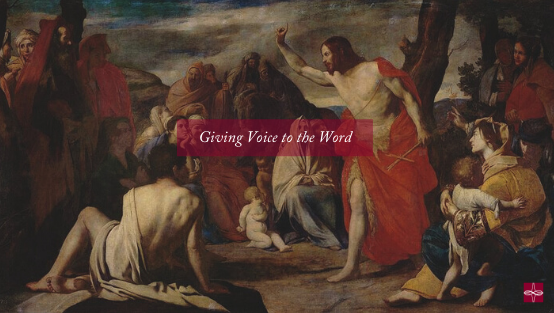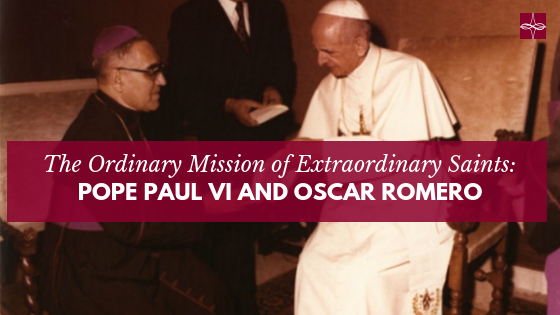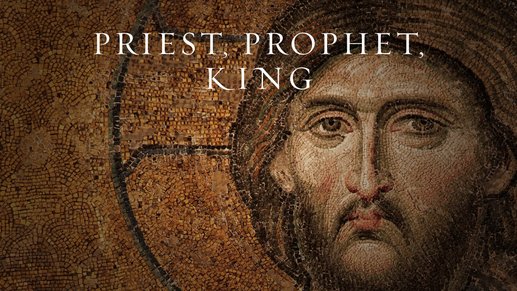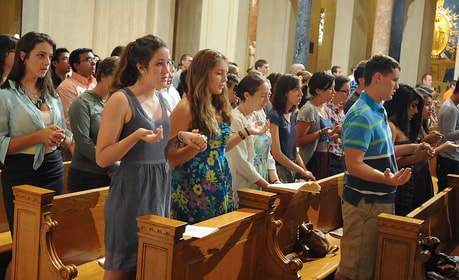|
If you’re used to communicating with others via text message, then you’ve probably, at some point, received a message and interpreted it out of context. A curt reply with a period at the end could be misinterpreted as either passive aggressive or as an irritated response. This happens to me occasionally, and I always have to remember that without hearing a person’s message verbally, it can be difficult to understand what they’re really saying or implying. Maya Angelou’s quote rings true here: “Words mean more than what is set down on paper. It takes the human voice to infuse them with deeper meaning.” Our voices add a unique depth and fullness to our communications by revealing emotions, nuances, and subtle meanings more sharply than words alone can communicate. On this feast of the Nativity of St. John the Baptist, I am struck by St. Augustine’s words from this morning's Office of Readings: “Today we remember that Zechariah’s ‘tongue is loosed because a voice is born.’” St. John the Baptist was born to be the final prophetic voice who proclaimed the Word made flesh. Like the Old Testament prophets, John foretells the coming of the Messiah and calls sinners to repentance with words that cut to the heart (Luke 3:1-29). But, unlike the Old Testament prophets, John identifies the Messiah for the first time in salvation history. John points Jesus out and encourages his followers to pursue him (John 1:29-37). He is confident that his cousin is the foretold Christ, and by his proclamation John fulfills the mission of all the prophets as he straddles the boundary of the Old and New Testament. John’s historical mission of giving voice to the Word is also our mission. At our baptism, we were anointed as a priest, prophet, and king. We share uniquely in Jesus’s ministry, and we are called to be lay prophets who proclaim the good news of repentance and redemption. We must, like John the Baptist, spend time coming to know the promises of the Messiah so that we can recognize Him when we see him. And when we see Him present in the sacraments, or when we encounter Him as we are accompanied by a spiritual mentor, or when we experience Him through the fullness of our prayer, we must point Him out for all to see. To fulfill our baptismal call to be prophets of the Gospel of Christ, we must give voice to our experiences of God. John’s words must be our words to the world, “Behold, the Lamb of God.”
0 Comments
On October 14, 2018, Pope Francis will canonize two great church leaders who helped shape Catholicism across the globe in the second half of the twentieth century: Pope Paul VI and Archbishop Oscar Romero. In reflecting on their lives, I cannot do justice to the complex and controversial circumstances that forged these extraordinary men into the saints they are. Instead, I’d like to reflect on something common and fundamental to us and them: Baptism. Baptism sets the foundation for a lifelong calling and mission. The Catechism calls Baptism “the basis of the whole Christian life” and “the gateway to life in the Spirit” (CCC 1213). A saint is someone who lives their baptismal identity to the full. The three fundamentals we are called to live and practice “on entering the People of God through faith and Baptism” (CCC 783) are what we call the “three offices of Christ”: Priest, Prophet, and King. What made Pope Paul VI and Archbishop Oscar Romero saints was the integrity and fullness with which they lived out their baptismal vocations as priest, prophet, and king. Priestly Vocation Both Pope Paul VI and Oscar Romero were ordained Catholic priests, but by virtue of their Baptism they shared what we call the “priesthood of the faithful.” What is this priestly vocation? We live it by offering prayer and sacrifice for others. At the heart of every saint is a love for and commitment to prayer. Archbishop Romero lived his priestly vocation in a powerful and tragic way when he was martyred on March 24, 1980 while celebrating Mass in Divina Providentia Hospital—uniting his prayer and sacrifice with Christ’s into eternity. Prophetic Vocation Paul VI and Oscar Romero excelled at the way they lived the prophetic vocation of their Baptism. A prophet, in the biblical sense, is someone called by God to deliver a message of truth through either words or actions. One of my favorite descriptions of a prophet is one who comforts the afflicted and afflicts the comfortable. During their lifetime, prophets are often inconvenient, unpopular, or even attacked, but history proves they shared the right message at exactly the right time. Both Paul VI and Oscar Romero faced harsh criticism, and Romero (as did many other prophets through history) suffered martyrdom. When Paul VI issued the encyclical letter Humanae Vitae (1968), which affirmed traditional Catholic teaching on sexual ethics, he faced a wave of criticism and dissent in the Church. Fifty years later, many Catholic moral theologians and historians see that his analysis and predictions were right on target. Archbishop Romero, standing in the tradition of Old Testament prophets like Amos and Isaiah, stood up and spoke out to the government (known as the Junta) in his home country of El Salvador, as well as other world governments (including the United States), on behalf of the poor and marginalized who were being treated unjustly. Like Paul VI and Romero, every baptized person is called to stand up and speak out for truth and justice, especially when it is unpopular or inconvenient. Royal Vocation While we gravitate toward thinking of the “royal” or “kingly” role as one of being above or served by others, it is actually the exact opposite. A true leader is one completely dedicated to serving others through his administration and decision-making. I can think of few more monumental or difficult tasks a church leader faced than Pope Paul VI when he was called by the Church to steer the conclusion and implementation of the Second Vatican Council (1962-65), which has been called the single most important religious event in the twentieth century. Archbishop Oscar Romero was often criticized for his ecclesial administration getting mixed up with the political situation. Yet Romero recognized that in order to effectively lead and serve the church under his pastoral care, he needed to engage the civil government around him. We, like Paul VI and Oscar Romero, do not become saints by being perfect administrators or leaders, but by bringing God’s spirit of wisdom into the challenges and opportunities that come our way. I would guess that at their baptism and even priestly ordination, Paul VI and Oscar Romero had no idea how God had planned for them to exercise their royal vocation. Under extraordinary times and circumstances, these saints modelled for us how we all are called to exercise leadership in ordinary, everyday circumstances with humility and whole-hearted devotion to God and others. On October 14, let us rededicate ourselves to living our own priestly, prophetic, and royal vocation of Baptism with the same spirit and integrity as Pope Paul VI and Archbishop Oscar Romero. Please click the following links for more information about the canonization and lives of Pope Paul VI and Oscar Romero. A man named John was sent from God. He came for testimony, to testify to the light, so that all might believe through him. (John 1:6-8)
The first word that comes to mind upon reading this Gospel is humility. In response to questions from the priests and Levites, John explains that he baptizes not as Christ, Elijah, or the Prophet, but as “the voice of one crying out in the desert, ‘make straight the way of the Lord’.” John is so quick to point out this distinction, so quick to give credit where he feels credit is due. Reflecting back to my years of service as a Lasallian Volunteer and Good Shepherd Volunteer, I think I could have used a slice of this humble pie. How often did I consider myself “the light,” taking on the responsibility to serve, or save, the communities I entered? How often did I fail to see the parts of myself that needed saving, and that this saving work was never really mine to begin with? Thanks to time, perspective, and most of all, the grace of God and those I have encountered, I continue to be humbled - moved beyond my self-righteousness, and into a space of more authentic listening, learning, and loving. These moments, in all their discomfort and vulnerability, become my testimony; through the gift of growth, I can “testify to the light.” Focus on: COMMUNITY In this Gospel, the questions posed by John’s community invite him to name who he is and what he is about. Community often provides this challenge and gift - holding a mirror up to our past, present, and future and reflecting how all these complexities meld and meet the world. How do your communities help you own your truth? In community, how can we help each other “testify to the light” within? SERVICE SUGGESTION: Spend some time reflecting upon someone in your community who has helped you grow more into who you aspire to be. Write a note of appreciation, take them out to coffee, or find some unique way to affirm them and acknowledge the influence they have had. PRAYER: Our Power to Bless One Another by John O'Donohue (Excerpt from To Bless the Space Between Us) In the parched deserts of post-modernity a blessing can be like the discovery of a fresh well. It would be lovely if we could rediscover our power to bless one another. I believe each of us can bless. When a blessing is invoked, it changes the atmosphere. Some of the plenitude flows into our hearts from the invisible neighborhood of loving kindness. In the light and reverence of blessing, a person or situation becomes illuminated in a completely new way. In a dead wall a new window opens, in dense darkness a path starts to glimmer, and into a broken heart healing falls like morning dew. It is ironic that so often we continue to live like paupers though our inheritance of spirit is so vast. The quiet eternal that dwells in our souls is silent and subtle; in the activity of blessing it emerges to embrace and nurture us. Let us begin to learn how to bless one another. Whenever you give a blessing, a blessing returns to enfold you. *This post was published in the 2017 Advent Reflection Guide, a collaborative effort between the Catholic Volunteer Network and the Catholic Apostolate Center. Click here to view the full guide. Katie Delaney is a former Lasallian Volunteer and former Good Shepherd Volunteer. To learn more about faith-based service opportunities through the Catholic Volunteer Network, please click here. “She said yes!” is commonly heard in engagement stories, echoing the excitement and joy of making the decision to have one’s life forever complemented with another in marriage. As we prepare to celebrate the Solemnity of the Annunciation on Saturday, the Church rejoices in Mary’s acceptance of God’s place for her in His divine plan of the salvation of mankind. Of course, Mary’s “yes” to God is not the only such instance in Scripture; on the contrary, each protagonist’s story within its pages involves his or her responding to the will of God throughout history, from God’s command to “be fruitful and multiply” to Adam and Eve through his instruction to the exiled St. John the Evangelist to “Write, therefore, what you have seen, what is now and what will take place later.” Just like each person in Scripture, we too can share in the delight of accepting God’s will for us through our faith and the surrendering of our personal desires and wants to Divine Providence. Every book of the Bible recounts at least one instance of God calling a prophet, judge, king, or another figure, no matter their status, to a higher purpose. I particularly enjoy the story of the boy Samuel, whom God called three times before the future judge and prophet, finally understanding Who kept waking him, answered. All of these accounts are more than nice stories—they serve to illustrate the different ways of answering God’s call as well as how God continues to guide us after we answer. The biblical theme still rings true today: “I have called you by name, and you are mine.” On the occasion of the Annunciation, Mary’s “yes” undoes Eve’s “no” to God. Through Mary, the Word was made flesh and she became the new “Mother of the Living” (CCC 489). This motherhood extends to us all! As a result of Mary’s “yes,” she became a tabernacle of the living God now made man. Christ’s complete embrace of humanity during His earthly ministry still affects us today. We are called to allow Him to more fully enter into our lives just as He did in the Virgin’s womb. By creating space for Christ, as Mary did, we are enabled to fully surrender to the Divine Will; our “yes” to God can then echo Mary’s crucial response, “Behold, I am the handmaid of the Lord. May it be done to me according to your word.” How shall we respond? At the Archdiocese of Washington’s Rite of Election this past month, I was blessed to observe over a thousand adults, teens, and children be presented to Cardinal Wuerl in order to be baptized or confirmed as Catholics in the Archdiocese of Washington this Easter. They, like Mary, have said “yes!” to God’s invitation. It’s a beautiful witness to see the participants’ formal expression of their desire to become Catholic before their loved ones, sponsors, and the Church. The Rite of Election kicks off a final period of intense spiritual preparation much like our experience of Lent. This call to conversion, Donald Cardinal Wuerl noted, “is a visible sign that women and men, young and old, from all walks of life, are continuing to respond to our Lord’s invitation: ‘Come, follow me.’” As baptized members of Christ’s Body, we are called to offer our support, love, and prayers for these catechumens and candidates as each continues his or her faith journey, that all may strive to remain close to the Lord Who has called them to Himself. Our “yes!” does not occur in a vacuum. Even the already baptized are called to be a light for each other as each of us experiences darkness in our lives. No matter our insecurities or doubts, no matter our past failings or unworthiness, God still continuously calls to us, ever lovingly, ever patiently, ever gently, ever earnestly. Mary had her own questions when the archangel Gabriel dramatically announced God’s plan for her. If you’re like me, you want all the details before making a decision! But, as we read throughout scripture, one’s trust in God is never misplaced. God can—and does—do great things through us if only we allow ourselves to be like “a little pencil in the hand of a writing God.” May we, then, always share the Good News of Christ’s Resurrection, the hope that we share as we receive Communion, as we journey to the Cross, and as we profess—and experience—God’s love. By the grace of God and the support of each other, may we, at every moment of our lives, join with the whole Church and the heavenly host to praise God for His mercy and goodness: “‘Our Savior, Jesus Christ, has destroyed death, and brought us light and life!’ No wonder we [reply], ‘Alleluia!’” To celebrate the Catholic Apostolate Center passing 50,000 "likes" on Facebook, Communications and Social Media Intern Andrew Buonopane created a list of 50 Ways to Enjoy your Faith. This is the third post in a five-part series where we'll share the whole list. Check back on the first Tuesday of the month for another installment! #29 - Devotion to St. Joseph St. Joseph is a great role model for all Catholics. Through his devotion to Mary and Jesus St. Joseph teaches us about familial love. The month of March celebrates St. Joseph including on his feast day on March 19th! #28 - Learn what it means to be priest, prophet, and king We often hear about Christ being referred to as priest, prophet, and king, but did you know that these three titles can also apply to other areas of the Church as well? Take some time to research how you can live out the role of priest, prophet, and king in your own life. #27 - Assume the best intentions It’s easy to rush to judgment, but sometimes we can be too hasty. This Lenten season, instead of getting frustrated and making quick judgments, try to see the best in everyone even when it is difficult. #26 - Learn about the New Evangelization The New Evangelization is talked about a lot, but have you taken the time to learn more about it and how you can be a model of the New Evangelization in your own life? Try checking out our New Evangelization Resource page to learn more! #25 - Make a friend! We can often become comfortable in our social lives, sticking with the people we are comfortable with. But making new friends is rewarding (even if it can be difficult to do). Try making a new friend this month and see how new a relationship can enrich your life. #24 – Take a friend to Mass Try inviting someone new to Mass this Sunday. Perhaps they are Catholic and haven’t been to Mass in a while or perhaps they have never been before. #23 - Liturgy of the Hours Have you ever prayed liturgy of the hours before? If not try it! Liturgy of the Hours is a great way to keep prayer a part of your entire day. For more information check out our Prayer and Catechesis resource page! #22 – Rosary The Rosary is a great way to show devotion to the Blessed Mother. If it’s been a while since you last prayed a Rosary, pray one this week! #21 - Faith & Reason Faith and Reason often can often be painted as at odds with each other. But in fact, they are very complementary. If it’s not something you’ve thought about before, check out this article where Pope Francis discusses how faith and reason intersect.
To read the previous installment in this series, click here: Part I | Part II Andrew Buonopane is the Communications and Social Media Intern at the Catholic Apostolate Center A few weeks ago my first niece was born. Needless to say, the pride of being an aunt flooded me and the joy of this news was shared with every person I spoke to. In these conversations I had one of those “you know you are a Catholic when” moments. The question that persistently followed “What is her name?” was “When is she going to be baptized?” This got me to think, “What’s the big deal?” And then the Holy Spirit hit me with, “PRIEST, PROPHET and KING!”
In infant baptism, we are not only cleansed of original sin and saved from “eternal damnation.” We are chosen and claimed. When immersed into the water with the Trinitarian rite – Father, Son, and Holy Spirit – baptism is signifying and actually bringing about “death to sin and entry into the life of the Most Holy Trinity through configuration to the Paschal mystery of Christ” (CCC 1239). But our rite doesn’t end there. As. Fr. Kevin Nadolski, OSFS, puts it, “we are then slathered in Jesus gel and given a crown of royalty.” In being anointed with Sacred Chrism, we are chosen by God, claimed by Christ and through the Holy Spirit are named priest, prophet and king (CCC 1241). St. Francis de Sales writes, “Be who you are, and be that well.” We, as baptized, are priests. We are prophets. We are royalty. The call as baptized disciples is to live these attributes and to live them well. Lumen Gentium explains that by our priestly duty we are called to “consecrate the world itself to God” (LG 34) through our works, prayers, activities, and daily responsibilities. It explains that as prophets we are to announce Jesus Christ by life and word and be witnesses to “life springing forth from faith (LG 35).” And lastly, that as His disciples we are named as His kings so that we too “might be constituted in royal freedom and that by true penance and a holy life [we] might conquer the reign of sin in [ourselves]” (LG 36). This winter, my niece will join us in our royal dignity and become a priest, prophet and king! At that time I will begin to tell her, “Be who you are, and be that well,” and will continue to say that as she grows. The challenging part will be looking at myself as a Baptized Catholic and answering the question, “Am I being who I am – priest, prophet and king – and being that well?” Pam Tremblay is the Blog Editor for the Catholic Apostolate Center. |
Details
Archives
July 2024
Categories
All
|
About |
Media |
© COPYRIGHT 2024 | ALL RIGHTS RESERVED


















 RSS Feed
RSS Feed